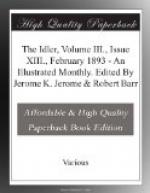“Josiah and Melinda at once consented, and the parson, noticing a little clearing in the woods on the left hand side of the road, and a flat sort of tombstone standing in the middle of it, said that he would stand on that stone and marry his young friends so quick that it would make their hair curl. He was particularly glad to meet with a handy tombstone, for he said that a tombstone was the next thing to a church, and that to be married by the side of a tomb would be almost as solemn as to be married in a minister’s study. So the party hastily descended; the parson mounted the stone; Josiah and Melinda joined hands in front of him, and they were married, and the parson had kissed the bride and pocketed his fee just as the Smiths’ waggon drove up and the Smith boys cocked their guns and covered the party. But the parson was wide awake. He had his revolver out and old man Smith covered before anybody had taken aim at him, but, instead of shooting, he remarked that he was a minister of the blessed gospel of peace; that there was no necessity for bloodshed, and that he would blow a hole through old Smith unless the Smith boys lowered their weapons and consented to argue the matter. ’The fact is, Colonel Smith,’ said the parson, ’you’re too late. The young people are legally married, and the sooner you accept the situation the better. I married them not two minutes ago, standing on that identical tombstone.’
[Illustration: “‘YOU’LL COME STRAIGHT HOME WITH ME.’”]
“Colonel Smith was a lawyer, and the sharpest one in that part of the country. He saw the force of the minister’s remarks, so he told the boys to put up their guns, and he shook hands with the minister. Then he inquired, in a careless sort of way, where Josiah and Melinda had stood while they were being married. The parson showed the footprints of the bride and groom, and then Colonel Smith turned to Melinda and said, ’You’ll come straight home with me. There hasn’t been any marriage yet. That stone is the boundary mark between Indiana and Illinois, and you were standing in Indiana and that other idiot was standing in Illinois when the parson tried to marry you. Nobody can marry in two States at the same time, and I shan’t recognise the pretended marriage till a court of law compels me to do so, which will be never. I hope this will teach you the folly of fooling with Methodism. When you want to get married next time try a Baptist minister, who will know the difference between a tombstone and a boundary mark.’ There were too many Smiths, and they were too well armed to be reasoned with successfully, so the upshot was that Melinda went home with her family, and Josiah and the parson went to see a lawyer.




